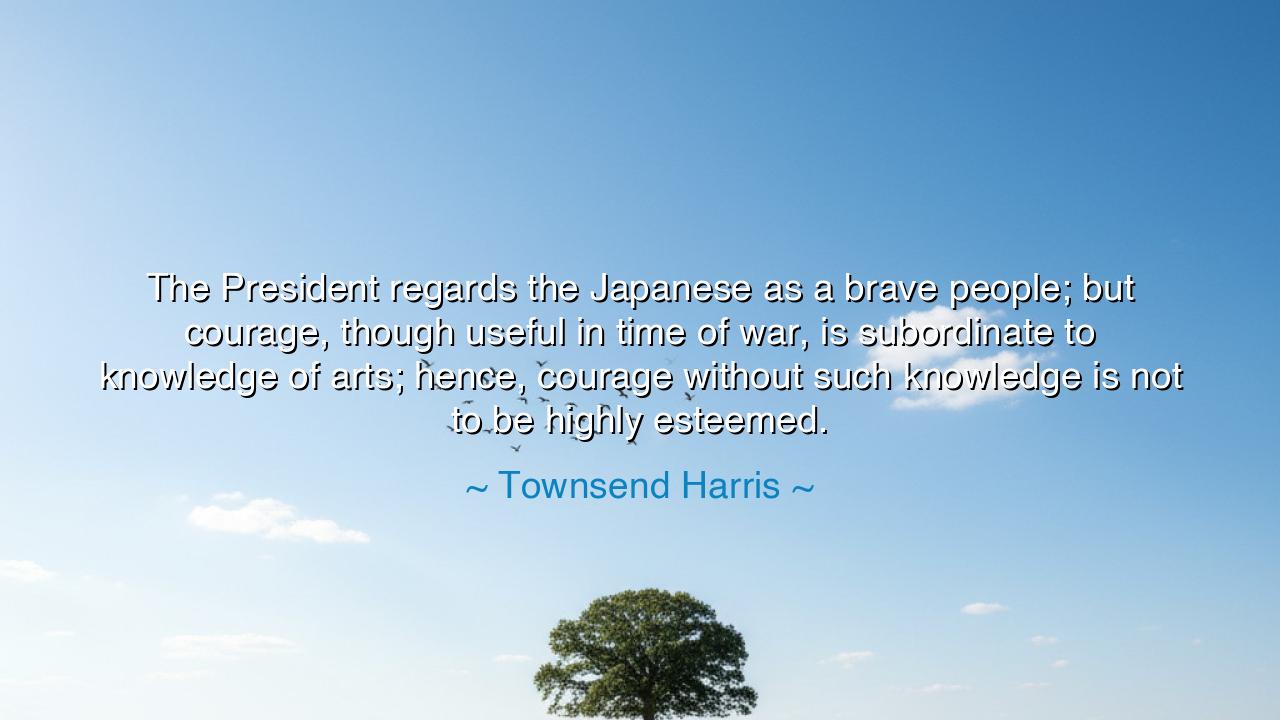
The President regards the Japanese as a brave people; but
The President regards the Japanese as a brave people; but courage, though useful in time of war, is subordinate to knowledge of arts; hence, courage without such knowledge is not to be highly esteemed.






When Townsend Harris, the first American Consul to Japan, declared, “The President regards the Japanese as a brave people; but courage, though useful in time of war, is subordinate to knowledge of arts; hence, courage without such knowledge is not to be highly esteemed,” he spoke as one standing at the crossroads of two worlds—the sword and the scroll, valor and wisdom. His words, though diplomatic in form, carry the eternal voice of philosophy. He recognized that courage, though noble and shining, is not the highest virtue; for without knowledge, it is like a sword without a hand to guide it. A brave man may conquer in battle, but a wise man builds a civilization.
In Harris’s time, the mid-nineteenth century, Japan stood upon the edge of transformation. The ancient code of the samurai—rooted in honor, discipline, and valor—had long defined the spirit of the nation. Yet now, as ships of iron and engines of steam crossed the Pacific, a new age had dawned: one of learning, invention, and art. The emissary from America did not speak to belittle Japan’s valor, but to offer a truth that transcends nations—that the mind must rule the sword, and that true greatness is found not only in bravery, but in the mastery of knowledge and the cultivation of art.
For courage without wisdom is but a tempest—fierce, blinding, and soon spent. The bravest warrior who knows not the art of peace will fight endlessly, never realizing that victory lies not in destruction, but in understanding. The ancients of every land have known this. In Greece, Pericles once said that the power of Athens rested not only on its soldiers, but on its schools, its poets, its builders, and its philosophers. For courage defends the walls, but knowledge raises them. And when both dwell in harmony, a nation shines like the morning star.
Consider the transformation of Japan itself after Harris’s age—the Meiji Restoration, when samurai laid down their blades and scholars took up pens. The courage that had once charged into battle now turned inward—to the courage of learning, the courage of change. In a few generations, Japan mastered the sciences, the arts, and the crafts of modernity, rising from isolation to greatness. It was as if the fire of courage had been refined into light—the light of knowledge, discipline, and creation. And so Harris’s words proved prophetic: bravery alone makes warriors, but bravery guided by learning makes a nation eternal.
Let the wise remember that the heart and the mind must walk together. Courage gives strength to act, but knowledge gives direction to act rightly. The reckless man rushes forward and perishes; the coward hesitates and achieves nothing; but the man who joins boldness with wisdom becomes the master of his destiny. In the forging of the self, as in the forging of steel, fire alone is not enough—the hammer of reason must give it shape.
And so, my child of tomorrow, learn from both the sword and the scroll. Be brave, but not rash; learned, but not proud. Let your courage drive you to seek truth, and let your knowledge teach you to use that courage for good. In times of peace, be the builder; in times of war, the protector. Study the arts, the sciences, the beauty of words and the laws of the world, for these are the tools that endure when the noise of battle has faded.
In this way, Townsend Harris’s wisdom becomes timeless. He saw that the nations which endure are not those that shout loudest on the field, but those that listen, study, and create. A sword may win a moment, but a pen wins a century. A brave heart may conquer an enemy, but a wise mind conquers time itself. Therefore, cherish courage, but let it bow before knowledge of arts, for the truest heroes are not those who destroy, but those who enlighten. And when both courage and wisdom dwell within you, you will stand not only as a fighter of wars—but as a builder of worlds.






AAdministratorAdministrator
Welcome, honored guests. Please leave a comment, we will respond soon